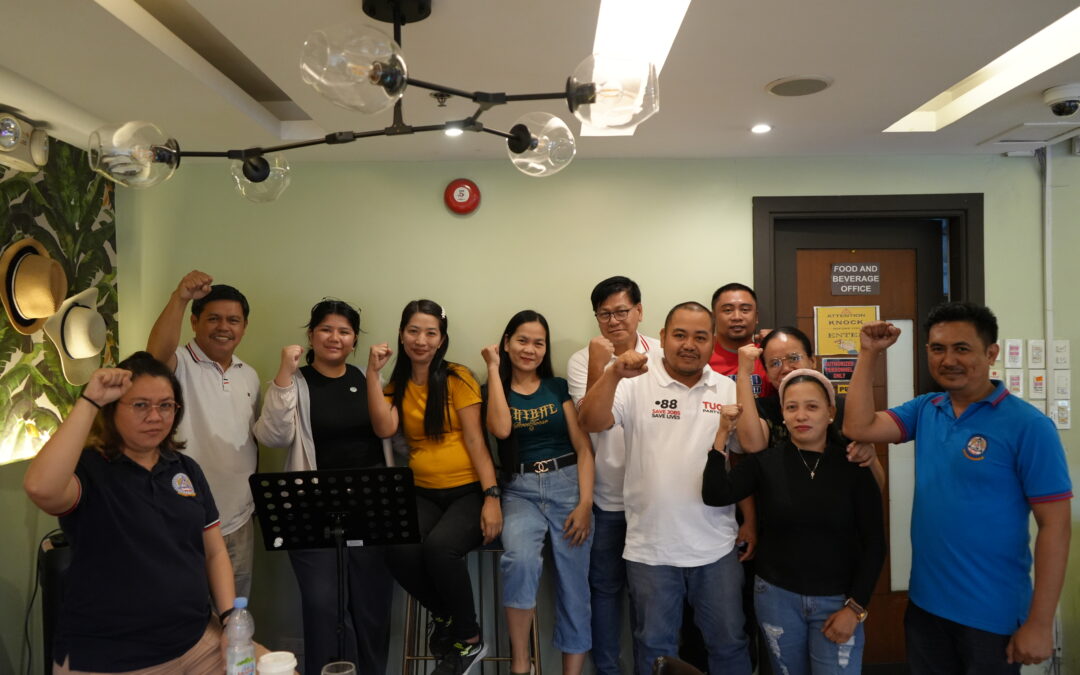
Mar 20, 2024
In the latest effort by a Philippines luxury bag manufacturer to break a nascent union, nearly 1,000 workers were forced to take leave from January until March, denying them three months wages. This is the second round of forced leave imposed at the 3,000-worker facility in recent months, and one more action by the company to dishearten organized workers.
In September, soon after the D’Luxe Bags Union won the election to represent workers at the factory, Patricio Tago, then union vice president, was abducted and imprisoned on false drug charges. The company has threatened to close the factory and transfer operations to a sister plant in the neighboring province. And workers face intimidation and increasingly difficult working conditions.
The Philippines is ranked as one of the 10 worst countries for working people by the International Trade Union Confederation, specifically for violence against and arrest of trade unionists, and union busting.
Union leaders are fighting to end the forced leave and to secure a strong collective bargaining agreement with D’Luxe Bags–which produces women’s bags for luxury brands like Coach and Michael Kors. The factory is owned by Luen Thai Holdings Ltd., a Hong Kong-based manufacturing and investment company.
Union President Angel Soliven said workplace conditions have declined since the union victory in September, and forced leave continues to occur despite quotas. While intimidation tactics often target union leaders directly, worsening work conditions affect everyone.
“They’ve been taking away our incentives in increments,” says Soliven. “We used to get 2,000 pesos (about $36) monthly before 2019, but now we only receive 5 pesos (about 9 cents) at the most.”
A lot of the workers depend on incentive pay to supplement their income, as the provincial minimum wage is only 10,000 pesos (about $180) per month.
“We also have to reach a target quota of 130 to 180 bags per day, and they threaten us with forced leave if we don’t meet that,” she says.
Despite the challenges, the union is determined to stand strong.
“We keep fighting so that we get to work in better conditions,” Soliven says.
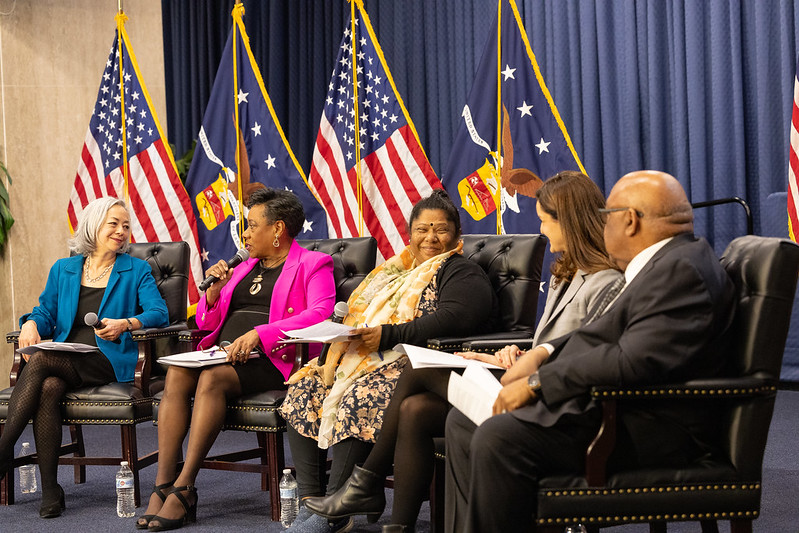
Mar 29, 2023
On the eve of the Summit for Democracy, high-level U.S. government officials and domestic and international labor activists highlighted the fundamental role of trade unions to reinforce, expand and protect democracy around the world at an official summit side event.
The event Tuesday, March 28, “No Democracy Without Unions: Labor Movements as Defenders of Democratic Rights,” featured Kalpona Akter, executive director of the Bangladesh Center for Workers Solidarity; Fred Redmond, AFL-CIO secretary-treasurer, president of the Trade Union Confederation of the Americas and a Solidarity Center board member; Becky Pringle, president of the National Education Association; Kelly Fay Rodriguez, State Department special representative for labor affairs; and video messages from Maung Maung, president of the Confederation of Trade Unions-Myanmar, and Lizaveta Merliak, leader of Salidarnast, an association of exiled Belarus labor unionists. The event was co-hosted by the U.S. Department of Labor, U.S. Department of State and U.S. Agency for International Development.
State Department Under Secretary for Civilian Security, Democracy and Human Rights Uzra Zeya opened the event by underscoring “unions’ unique and critical contributions to democratic societies.” She emphasized the dangers faced by labor activists fighting for basic rights, including Chhim Sithar, a Cambodian union leader imprisoned for her organizing work, and the Belarussian union leaders recently sentenced to lengthy prison terms for exercising their fundamental right to freedom of association and assembly. “These cases are emblematic of closing space for civil society champions writ large around the world,” she said.
Deputy Undersecretary for International Affairs at the U.S. Department of Labor Thea Lee, event moderator, concurred. “Governments that cannot tolerate democracy, cannot tolerate criticism are the most vicious in silencing worker movements,” she said.
“The fact the authoritarian regimes have tried to silence activists like Maung Maung and Lizaveta only underscores their leadership as champions of democracy and democratic values,” Lee added. “Democratic, grassroots workers movements threaten dictatorship.”
Indeed, worker movements have brought down dictatorships. Fred Redmond cited the example of Brazil, where labor led a mass civil society movement—including key strikes in the 1970s—and helped return democracy to the country and where, at the beginning of this century, the administrations of President Luiz Inácio “Lula” da Silva and President Dilma Rousseff—both former labor leaders—helped lift 40 million Brazilians out of poverty.
“The survival of democracy anywhere depends on working people defending it,” said Redmond.
The entire session can be viewed here. Solidarity Center Executive Director Shawna Bader-Blau spoke at a separate Summit for Democracy side event at the Center for Strategic and International Studies (CSIS), which can be viewed here.
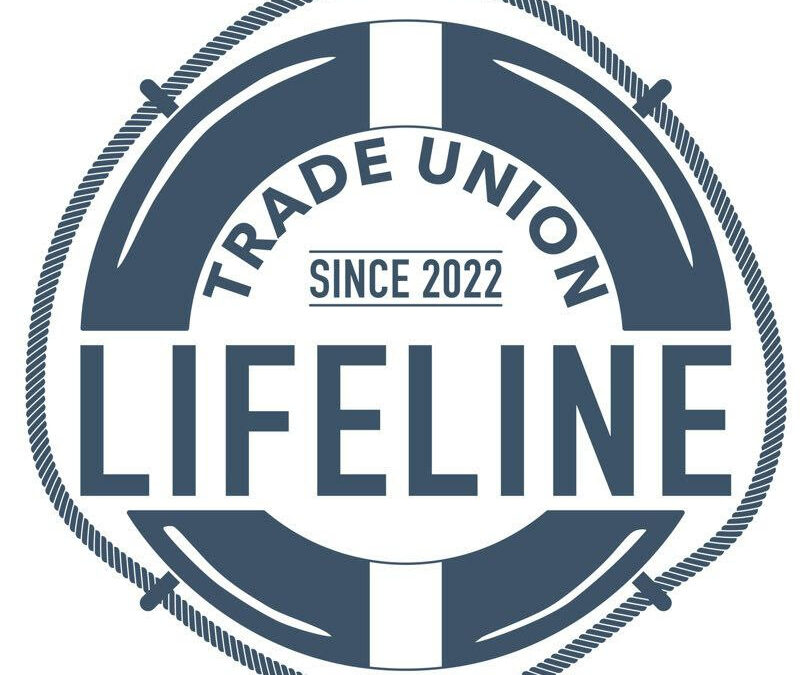
Feb 24, 2023
One year ago, military forces of the Russian Federation invaded Ukraine, launching an unprovoked and unnecessary war.
This war has cost thousands of lives and damaged Ukraine’s social and economic infrastructure, which will take years to rebuild. Russia’s attack on Ukraine is the direct cause of major food shortages and agricultural supply chain disruptions felt most painfully in lower-income countries. Yet, the citizens of Ukraine remain united in their resolve to defend their country, endure constant attacks on their civilian infrastructure, and struggle to keep supplies of grain and necessary goods flowing despite Russian restrictions.
Ukrainian workers and trade unions mobilized to become an integral part of the country’s home front. They not only keep the country’s civilian economy moving in areas like agriculture, railways, electrical utilities, education, health care and public administration, but they have also volunteered their time to meet the country’s humanitarian crisis. Ukrainian unions, including the Federation of Trade Unions of Ukraine (FPU) and the Confederation of Free Trade Unions of Ukraine (KVPU), and a number of independent unions have converted union property into housing for internally displaced people, created supply chains for humanitarian aid and turned union halls and offices into community centers for those in need of assistance.
The Solidarity Center supports these union partners’ humanitarian work as well as their efforts to defend worker rights. Despite the difficulties of war, unions continue to support workers in all areas of the Ukrainian economy with organizing and bargaining support, education and legal assistance, and they continue to defend worker rights in democratic debate at all levels of governance in Ukraine. The staff of the Solidarity Center and its Ukrainian partner Labor Initiatives (LI) continue to assist Ukrainian unions and partners with technical assistance, training and legal aid. In addition, Solidarity Center and LI staff have joined in the humanitarian effort, helping to create the Trade Union Lifeline, a network of unions and activists working to move humanitarian aid to where it is needed the most. The resilience of Solidarity and LI staff, to continue working through the intense stress and violence of the war to forward the mission of the Solidarity Center and the international trade union movement, is notable and praiseworthy.
The Solidarity Center joins with the AFL-CIO in honoring the work of Ukrainian unions and working people and calling for end to the violent invasion of a sovereign nation and for peace, reconstruction and democracy in Ukraine and the region.

Dec 24, 2022
On Thursday, December 22, the global labor movement lost a giant.
Moussa El Jeries, affectionately known as Abu George, was a Palestinian refugee who was forced to leave his small village Al Bassah in 1948 at the age of 4. He fled with his family to Lebanon and later joined the Palestinian trade union movement in the diaspora. Mirroring the story of so many Palestinian refugees, he moved again with his family in the 1980s before finally settling in Norway with his family—his wife, son and five daughters.
Abu George was a tireless champion of working people around the world and a committed trade unionist. In the 1990s he focused his efforts on encouraging European unions, the International Labor Organization (ILO) and global union federations to support trade union programs aimed at promoting women’s equality and leadership in the labor movement. He also became the global labor movement’s leading voice advocating outreach and support and connection to the Palestinian labor movement in the West Bank and Gaza Strip.
Said Abla Masrujeh, country program director for the Solidarity Center in Palestine and former Palestine General Federation of Trade Unions (PGFTU) activist: “I met Abu George for the first time in 1995 when he visited his homeland for the first time as an ILO Norway staff person and respected Arab leader, to discuss how he could help the women’s movement within the PGFTU. Within a few weeks, he came back with a generous grant that enabled unions to build women’s structures that soon became a model for unions to emulate across the region.”
Abu George worked relentlessly in solidarity with women’s movements and for women’s equality. Among other good works, in 1996 he brought labor leaders from Norway to an important women’s conference in Nablus, Palestine, where nearly 130 women trade unionists from across Palestine gathered to discuss and advance women’s rights in the movement. He was often found in conversations with women’s rights advocates, listening and learning and helping plan for change, even where it was not “acceptable” for men to do so. Masrujeh recalled this time: “I traveled with him to help sister unions across the Arab world establish women’s committees and departments and advance women’s voices. He was a courageous colleague and a great mentor for many union brothers and sisters, including me. I will always remember him.”
El Jeries struggled with illness in his retirement but never stopped championing the causes of equality, justice and humanity for the Palestinians and for all people. He was known for his wonderful sense of humor and capacity for love, friendship, poetry and storytelling. He leaves behind his wife, children and grandchildren, and thousands upon thousands touched by his leadership and his friendship across the trade union movement. The Solidarity Center joins in commemorating the life and legacy of Moussa El Jeries, Abu George.
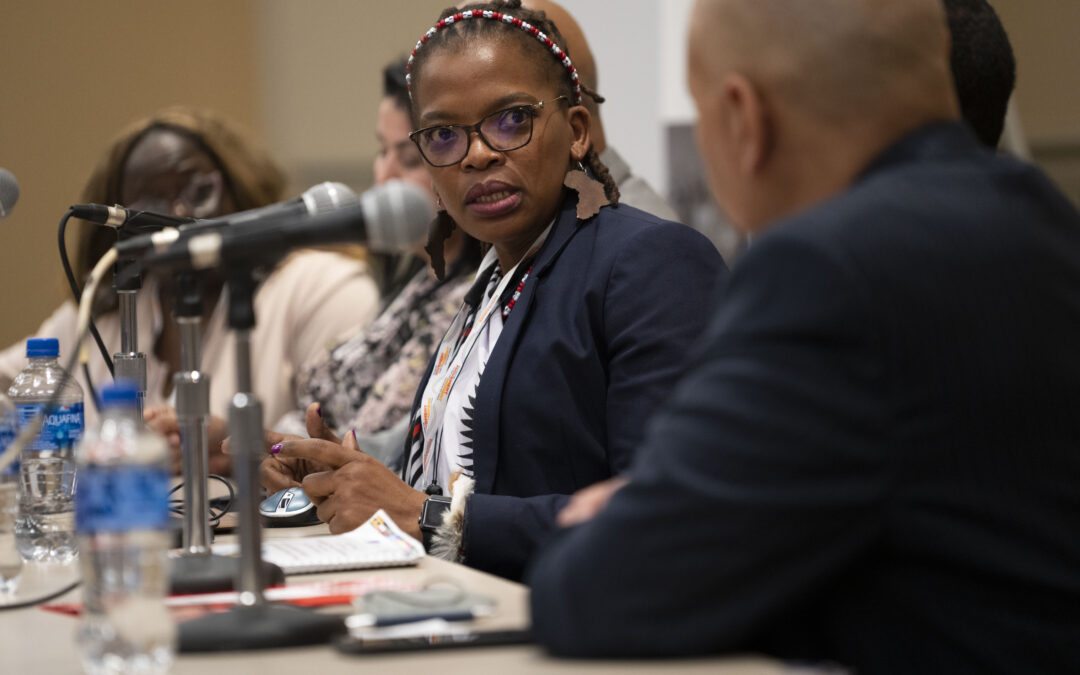
Jun 17, 2022
The Global Organizing Symposium, a daylong side event of the AFL-CIO Convention, brought together workers and activists from around the world to share experiences focused on building collective power for workers post-pandemic and highlighted their role in fighting authoritarianism and bolstering democracy. Sessions focused on platform worker rights, clean-energy models that both address climate change and work for workers and building a movement racial equality.
In the first session, panelists shared how gig workers in the platform economy are organizing globally to create decent work in a sector notorious for low-balling pay and denying rights and benefits.
As the pandemic took hold two years ago, app-based delivery workers in Mexico—like their counterparts around the world—encountered increasingly dangerous working conditions. When one worker was killed on the job and the company did nothing, they knew the only way to protect themselves and their livelihoods was to join in common cause.
The workers formed a colectivo they called Ni Un Repartidor Menos (Not One Delivery Worker Less) to address egregious and life-threatening job hazards, among them sexual harassment, violence, injuries fatal and less so, as well as unfair laws that have levied onerous taxes on wages and for the use of infrastructure, like sidewalks.
Saúl Gómez, founder of Ni Un Repartidor Menos, told a gathering of almost 300 union activists convened ahead of the AFL-CIO Convention for the Global Organizing Symposium last weekend that the app company cares little about the workers, and customers can act with impunity toward delivery people. Women workers, in particular, face inappropriate behavior and additional safety risks. For example, Gómez said it was not unusual for naked customers to receive deliveries. Even worse: One woman worker delivering to a residence in one of Mexico City’s toniest neighborhoods, Polanco, was held captive by the customer for nearly a week.
The customer suffered no consequences. The worker was fired when the company removed her from the app.
Defending Democracy and Hard-Won Rights
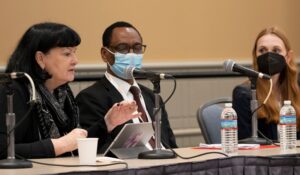
ITUC General Secretary Sharan Burrow discusses the erosion of democracy with Kassahun Follo Amenu from Ethiopia and Olesia Briazgunova from Ukraine. Credit: Jay Mallin
Speakers pointed to the erosion of democracy in their country and ways the labor movement is working to turn the tide. Nowhere is the conflict between authoritarianism and freedom more in the spotlight than Ukraine.
“We are paying a big price for independence,” said Olesia Briazgunova, international director of the Confederation of Free Trade Unions of Ukraine. Among the thousands of Ukrainians defending their country are union members, while other unionists are “dodging bullets and shelling to deliver humanitarian aid.
“At the same time, we are following situations in other countries like Myanmar, Belarus and Hong Kong, and every threat that spreads evil in the world.”
Tunisia, meanwhile, is going through an economic, financial, social and institutional crisis, and “conditions are deteriorating with the inability of the elite to develop democratic institutions,” said Hedia Arfaoui, deputy secretary general of the Tunisian General Labor Union (UGTT). Youth are especially disillusioned, she added, with little hope for employment or a reduction in the poverty rate.
Many Tunisians are concerned that the democracy gains made following the 2011 revolution—especially those made by women, including full equality under a new constitution—will be dismantled. Tunisian President Kais Saied, who is currently ruling by decree, has said he will replace the 2014 constitution. Hundreds of thousands of UGTT members took part in a general strike June 16.
“Women’s rights are an integral part of the human rights system. And Tunisian women and trade unionists are aware of the danger of rollbacks of all they have won,” she said.
In Ethiopia, where politics are based on ethnic groups and a divisive war continues, the Confederation of Ethiopian Trade Unions (CETU) promotes inclusion, peace and dialogue, said CETU President Kassahun Follo. As the largest multi-ethnic, civil society organization in the country, the union focuses on common goals, “uniting on workplace issues and labor rights,” he said. Since October 2021, CETU has organized 30,000 workers.
“There are no human rights, no labor rights without democracy. And today, fewer than 20 percent of people live in truly free countries,” highlighted Sharan Burrow, general secretary of the International Trade Union Confederation. “We can only ensure peace and democracy through justice.”
Participants also expressed concern over the situation in Hong Kong and pledged support to working people and unions in Hong Kong who are under severe pressure.
Workers, Unions and Climate Change
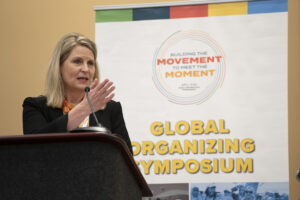
AFL-CIO President Liz Shuler engaged with participants at the AFL-CIO global side event. Credit: Jay Mallin
Lebogang Mulaisi, labor market policy coordinator of the Congress of South African Trade Unions (COSATU), said that very early on, COSATU recognized that “climate issues are workers’ issues,” and COSATU’s work to bring about a just transition is based on three principles: distributed justice, procedural justice and restorative justice. The first ensures the benefits and burdens of what is a very disruptive process be distributed. Procedural justice means everyone affected is involved in determining the rules that guide the transition. And with restorative justice, vulnerable populations most affected by unemployment and inequality—among them women and youth—are both participants and beneficiaries.
“It will take strong unions to bring about a just transition,” she said.
In Brazil, efforts to move toward the use of renewable energy are a challenge not least because democracy there is under threat, said Quintino Severo, deputy international affairs secretary of CUT Brazil. “A great challenge is to make sure all the rights we have won are respected,” he said. “Clean energy isn’t clean if it’s tainted by the blood of workers.”
Highlights of the event included keynote speeches by Liz Shuler, AFL-CIO president, and Uzra Zeya, U.S. under secretary for civilian security, democracy and human rights.
Cathy Feingold, AFL-CIO international director, moderated the symposium. Other speakers discussing organizing and democracy in the U.S. and European contexts were: Stuart Applebaum, president of the Retail, Wholesale and Department Store Union (RWDSU); Roxanne Brown, international vice president, United Steelworkers; Stephen Cotton, general secretary, International Transport Workers Federation; Atle Høie, general secretary, IndustriALL; Zingiswa Losi, president, COSATU; Biju Mathew, president, International Alliance of App-Based Transport Workers, Terrence Melvin, secretary-treasurer, New York State AFL-CIO; and Ashwini Sukthankar, director of global campaigns, Unite HERE.







